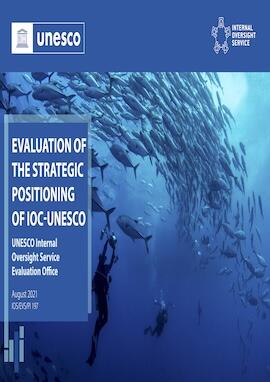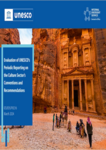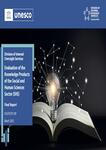Page Header
Evaluation of the Strategic Positioning of IOC-UNESCO
Overview
The Intergovernmental Oceanographic Commission (IOC-UNESCO) has functional autonomy within UNESCO. It is the only UN body specializing exclusively in ocean science, ocean observation, ocean data and information exchange and dedicated ocean services such as Tsunami Early Warning Systems. In 2019, UNESCO’s Intergovernmental Oceanographic Commission was tasked to lead the UN Decade of the Ocean. This opportunity, combined with a fast-evolving ecosystem of international actors in an expanding and increasingly crowded ocean policy and marine science space, prompted IOC-UNESCO to request an evaluation of IOC-UNESCO with a focus on its strategic positioning within the UN system and the broader landscape of ocean-related actors and programmes to meet the high demand for sound ocean science in an oceanographic space. The evaluation found that IOC-UNESCO is a valued partner for Member States as well as other international and national actors, and indispensable for strengthening capacities and providing the data and technical information on ocean science policy that serves as a basis for national level data. IOC-UNESCO has been most successful in providing contributions to UN Frameworks and Conventions (e.g. UNFCCC, Sendai and CBD), in acting as a neutral platform to discuss the increasingly relevant issue of ocean health and climate change, in bringing Member States together and fostering exchanges between governments and scientists, as well as in providing to the extended oceanographic community access to data, information and science. However, strategic advocacy at the national level, engagement at the regional level, and resourcing and visibility of gender equality and women’s empowerment in the ocean space within and outside IOC-UNESCO are among the areas where further improvements are required. The establishment of the Decade of Ocean Science for Sustainable Development is the most important strategic institutional achievement of IOC-UNESCO in recent years. It is an important opportunity, but the absence of a clearly defined results framework and inadequate resources could jeopardize its success. Furthermore, it still needs to be determined how to best exploit IOC-UNESCO’s data and knowledge base and how UNESCO can best support the Decade, among other through intersectoral work.Report Details
| Year Published | |
| Type | |
| Theme/s | |
| Joint | No |
| Partner/s | N/A |
| SDG/s | |
| Consultant name | |
| Agency Focal Point | Martina Rathner |
| Focal Point Email | m.rathner@unesco.org |
| Managed by Independent Evaluation Office | Yes |
| Geographic Scope | Global |
YOU 'RE READING
Evaluation of the Strategic Positioning of IOC-UNESCO











